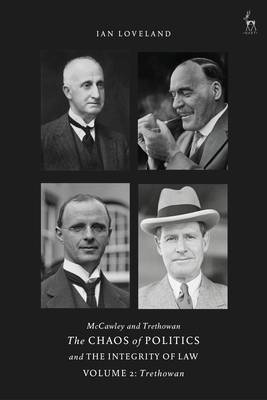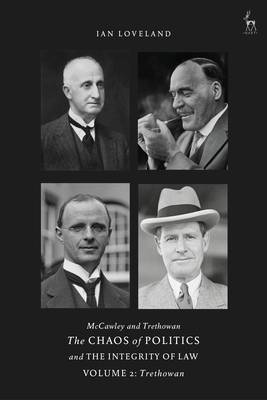
- Afhalen na 1 uur in een winkel met voorraad
- Gratis thuislevering in België vanaf € 30
- Ruim aanbod met 7 miljoen producten
- Afhalen na 1 uur in een winkel met voorraad
- Gratis thuislevering in België vanaf € 30
- Ruim aanbod met 7 miljoen producten
Zoeken
McCawley and Trethowan - The Chaos of Politics and the Integrity of Law - Volume 2
Trethowan
Ian Loveland
Hardcover | Engels
€ 112,95
+ 225 punten
Uitvoering
Omschrijving
In the second part of this two-volume study, Ian Loveland delves deeply into the immediate historical and political context of the Trethowanlitigation which began in New South Wales in 1930 and reached the Privy Council two years later. The litigation centred on the efforts of a conservatively-inclined government to prevent a future Labour administration led by the then radical politician Jack Lang abolishing the upper house of the State's legislature by entrenching the existence of the upper house through the legal device of requiring that its abolition be approved by a state-wide referendum.
The book carefully examines the immediate political and legal routes of the entrenchment device fashioned by the State's Premier Sir Thomas Bavin and his former law student, colleague and then Dean of the Sydney University law school Sir John Peden, and places the doctrinal arguments advanced in subsequent litigation in the State courts, before the High Court and finally in the Privy Council in the multiple contexts of the personal and policy based disputes which pervaded both the State and national political arenas.
In its final chapter, the book draws on insights provided by the detailed study of McCawley(in volume one) and Trethowanto revisit and re-evaluate the respective positions adopted by William Wade and Ivor Jennings as to the capacity of the United Kingdom's Parliament to introduce entrenching legislation which would be upheld by the courts.
The book carefully examines the immediate political and legal routes of the entrenchment device fashioned by the State's Premier Sir Thomas Bavin and his former law student, colleague and then Dean of the Sydney University law school Sir John Peden, and places the doctrinal arguments advanced in subsequent litigation in the State courts, before the High Court and finally in the Privy Council in the multiple contexts of the personal and policy based disputes which pervaded both the State and national political arenas.
In its final chapter, the book draws on insights provided by the detailed study of McCawley(in volume one) and Trethowanto revisit and re-evaluate the respective positions adopted by William Wade and Ivor Jennings as to the capacity of the United Kingdom's Parliament to introduce entrenching legislation which would be upheld by the courts.
Specificaties
Betrokkenen
- Auteur(s):
- Uitgeverij:
Inhoud
- Aantal bladzijden:
- 216
- Taal:
- Engels
Eigenschappen
- Productcode (EAN):
- 9781509948277
- Verschijningsdatum:
- 29/07/2021
- Uitvoering:
- Hardcover
- Formaat:
- Genaaid
- Afmetingen:
- 156 mm x 234 mm
- Gewicht:
- 476 g

Alleen bij Standaard Boekhandel
+ 225 punten op je klantenkaart van Standaard Boekhandel
Beoordelingen
We publiceren alleen reviews die voldoen aan de voorwaarden voor reviews. Bekijk onze voorwaarden voor reviews.








